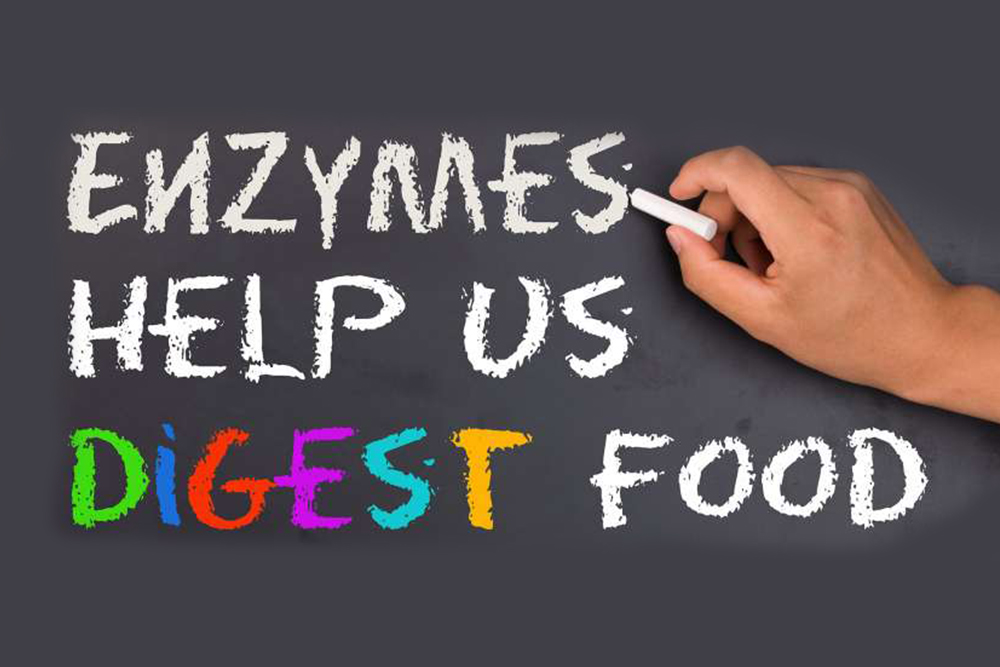Jun 15, 2021

Eat fresh fruits and vegetables to produce enzymes, essential for improving vital digestion boosting overall health.
Enzymes are essential to improve digestion and boost overall health. These tiny proteins initiate chemical reactions throughout the body to keep it running smoothly. Enzymes help the body break down and assimilate nutrients, as well as eliminate toxins. In all, more than 3,000 different enzymes assemble and disassemble human molecules.
Digestive enzymes turn food into components small enough to pass through the intestinal wall and into the bloodstream for delivery to individual cells. Metabolic enzymes, such as antioxidants (which provide cells with energy), clear away toxic debris and slow the ability of free radical compounds to promote disease and aging.
Good Digestion is Vital
Let’s focus on enzymes that promote digestion, which is the key to good health. Each of the many enzymes released into the digestive tract plays a specific role. For example, protease digests protein into small amino acids. Amylase helps break down carbohydrates into simple sugars such as glucose and fructose. Lipase turns fats into tiny fatty acids and maintains cell permeability to allow nutrients to flow easily into cells and waste to be eliminated.
Having too few enzymes can create digestive problems like nausea, belching, burping, gas, and diarrhea or constipation. Worse, a lack of protease can lead to food intolerances and allergies when the immune system mistakes large, unbroken protein compounds for an invader and attacks them. The consequence can reach far beyond simple digestive disorders and may include seemingly unrelated symptoms such as skin rashes, hives or headaches.
Without enough protease enzymes, the resulting protein deficiency can interfere with calcium metabolism, increasing the risk of developing osteoarthritis. The deficiency can also compromise your immune system, making you more vulnerable to bacterial and viral infections — possibly even cancer — and can encourage fluid retention and the formation of blood clots.
An adequate supply of protease helps prevent these conditions as well as infections such as gum abscesses, herpes, shingles, canker sores and inflammatory conditions (including skin rashes and allergic reactions to bug stings, poison oak and poison ivy). Lipase, amylase and trypsin are some enzymes found in commercial anti-inflammatory combinations to reduce arthritic pain.
There aren’t many cautions about taking enzymes, but don’t take protease if you have digestive tract inflammation, such as a peptic ulcer or hiatal hernia, because it increases acidity
Eating Your Enzymes
If you think you’re low on digestive enzymes, try eating more raw foods. Heat (about 118 degrees) destroys enzymes. One probable reason why there is considerable enzyme deficiency in the modern world is the reliance on processed foods.
Most digestive enzymes depend upon each other. For example, lipase needs other enzymes to ensure there is sufficient bile in the intestine and stomach acid to operate. Most digestive enzymes are activated at a specific pH, so they also rely on a healthy digestive tract.
Cellulase is one enzyme that’s not made by the body and is found only in raw fruits, vegetables and whole grains. Cellulase is responsible for obtaining glucose from soluble parts of fiber, and it helps prevent food allergies. So eat your fruits and veggies!
Supplemental Enzymes
If food isn’t sufficient to boost your digestive enzymes, try enzyme supplements, which are available at health-food stores. Both plant- and animal-derived enzyme supplements are available. Plant enzymes such as papain (from papaya peel) and bromelain (from pineapple) help aid digestion. They are available in chewable forms and taste quite sweet and pleasant.
Herbalists will tell you the taste of bitter herbs in teas or tinctures stimulates the release of digestive enzymes. Look for “bitters” formulas that include such herbs as dandelion leaf and root (Taraxacum officinale) and gentian root (Gentiana lutea). Just remember that you need to taste bitters for them to be most effective. Take supplements or herbs about 30 minutes before each meal. If you’re using enzymes to relieve a non-digestive disorder, such as inflammation or infection, take the supplements between meals. An enteric coating on metabolic enzymes allows them to pass through the stomach and be released in the small intestine.
Getting Enzymes from Food
Uncooked foods, such as raw fruits and vegetables, are usually high in enzymatic activity. Some foods, such as pineapple and papaya, are particularly rich sources of food enzymes.
The following fermented foods are also excellent “enzyme enhancers” and can be eaten in small quantities because they pack a big enzyme punch.
Yogurt and kefir (a fermented dairy drink)